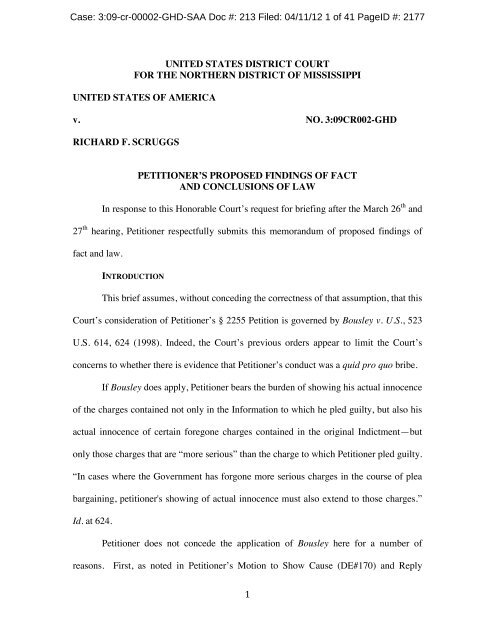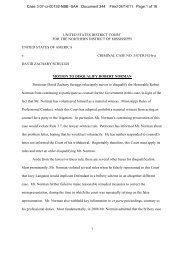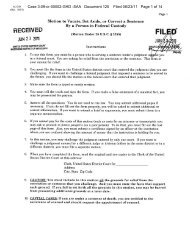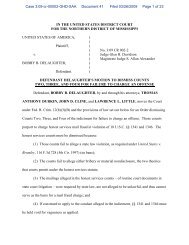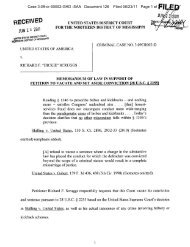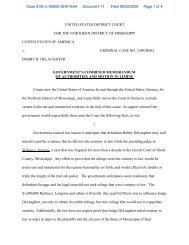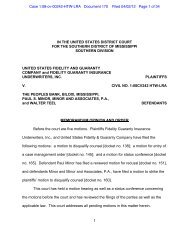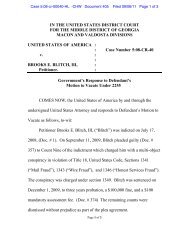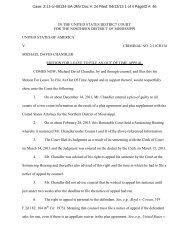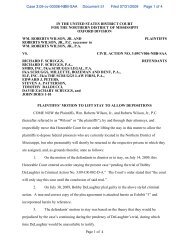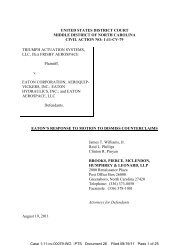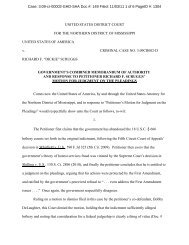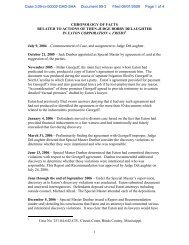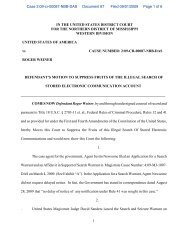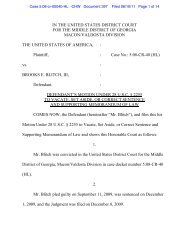Scruggs proposed findings - NMissCommentor
Scruggs proposed findings - NMissCommentor
Scruggs proposed findings - NMissCommentor
You also want an ePaper? Increase the reach of your titles
YUMPU automatically turns print PDFs into web optimized ePapers that Google loves.
!aaassseee::: 333:::000999---cccrrr---000000000000222---GGGHHHDDD---SSSAAAAAA DDDoooccc ###::: 222111333 FFFiiillleeeddd::: 000444///111111///111222 111 ooofff 444111 PPPaaagggeeeIIIDDD ###::: 222111777777<br />
UNITED STATES DISTRICT COURT<br />
FOR THE NORTHERN DISTRICT OF MISSISSIPPI<br />
UNITED STATES OF AMERICA<br />
v. NO. 3:09CR002-GHD<br />
RICHARD F. SCRUGGS<br />
PETITIONER’S PROPOSED FINDINGS OF FACT<br />
AND CONCLUSIONS OF LAW<br />
In response to this Honorable Court’s request for briefing after the March 26 th and<br />
27 th hearing, Petitioner respectfully submits this memorandum of <strong>proposed</strong> <strong>findings</strong> of<br />
fact and law.<br />
INTRODUCTION<br />
This brief assumes, without conceding the correctness of that assumption, that this<br />
Court’s consideration of Petitioner’s § 2255 Petition is governed by Bousley v. U.S., 523<br />
U.S. 614, 624 (1998). Indeed, the Court’s previous orders appear to limit the Court’s<br />
concerns to whether there is evidence that Petitioner’s conduct was a quid pro quo bribe.<br />
If Bousley does apply, Petitioner bears the burden of showing his actual innocence<br />
of the charges contained not only in the Information to which he pled guilty, but also his<br />
actual innocence of certain foregone charges contained in the original Indictment—but<br />
only those charges that are “more serious” than the charge to which Petitioner pled guilty.<br />
“In cases where the Government has forgone more serious charges in the course of plea<br />
bargaining, petitioner's showing of actual innocence must also extend to those charges.”<br />
Id. at 624.<br />
Petitioner does not concede the application of Bousley here for a number of<br />
reasons. First, as noted in Petitioner’s Motion to Show Cause (DE#170) and Reply<br />
1
!aaassseee::: 333:::000999---cccrrr---000000000000222---GGGHHHDDD---SSSAAAAAA DDDoooccc ###::: 222111333 FFFiiillleeeddd::: 000444///111111///111222 222 ooofff 444111 PPPaaagggeeeIIIDDD ###::: 222111777888<br />
(DE#181), Bousley does not apply when the Supreme Court determines that the<br />
Information to which Petitioner pled guilty fails to charge a crime recognized under the<br />
Constitution. After Skilling v. United States, 130 S. Ct. 2896 (2010), non-bribe honest<br />
services fraud does not constitute a crime. Because Petitioner pled guilty to a non-bribe<br />
honest services fraud, the crime to which he pled guilty is not and never was a crime.<br />
This is the uncontroverted teaching of Skilling: A criminal statute that fails to<br />
“define the criminal offense [1] with sufficient definiteness that ordinary people can<br />
understand what conduct is prohibited and [2] in a manner that does not encourage<br />
arbitrary and discriminatory enforcement” violates the Due Process Clause and is void for<br />
vagueness. Id. at 2927. See also, United States v. Bass, 404 U.S. 336, 349<br />
(1971)(reasoning that the law ought to have “an instinctive distaste against men<br />
languishing in prison unless the lawmaker has clearly said they should”).<br />
Thus Bousley, which involved the evidence necessary to support a conviction of a<br />
recognized and constitutionally-sufficient criminal statute, cannot apply here. Petitioner<br />
addresses this issue, and this Court’s reliance on United States v. Cotton 535 U.S. 625<br />
(2002) in a separate filing.<br />
Second, even if Bousley applies, Petitioner must show his actual innocence only<br />
of “more serious” foregone crimes. Giving the Indictment its broadest reading, the<br />
Government charged Petitioner with honest services bribery in Count II. This charge is<br />
no more serious than non-bribery honest services fraud. Thus, Bousley itself does not<br />
require Petitioner to show his actual innocence of quid pro quo bribery.<br />
Aside from Bousley, Petitioner has asserted that his so-called quid cannot become<br />
the basis for a crime. Petitioner’s call to then-Senator Trent Lott involved his<br />
2
!aaassseee::: 333:::000999---cccrrr---000000000000222---GGGHHHDDD---SSSAAAAAA DDDoooccc ###::: 222111333 FFFiiillleeeddd::: 000444///111111///111222 333 ooofff 444111 PPPaaagggeeeIIIDDD ###::: 222111777999<br />
constitutionally protected right to petition the government. And even if such a petition is<br />
not absolutely protected, the First Amendment carries with it protections that prohibit<br />
criminalization absent an explicit agreement to trade political influence for an illegal act.<br />
When a criminal statute applies to activity that furthers First Amendment interests, courts<br />
must exercise “particular care” to ensure that the statute “provide[s] more notice and<br />
allow[s] less discretion than for other activities.” United States v. Thomas, 864 F.2d 188,<br />
194 (D.C. Cir. 1988); see also Nevada Comm’n on Ethics v. Carrigan, 131 S. Ct. 2343,<br />
2353 (2011) (Kennedy, J., concurring) (vague statute affecting First Amendment interests<br />
“is an invitation to selective enforcement; and even if enforcement is undertaken in good<br />
faith, the dangers of suppression of particular speech or associational ties may well be too<br />
significant to be accepted”).<br />
In the constitutionally protected context of petitioning the government, the<br />
Supreme Court has recognized the need to erect robust protections around democratic<br />
political activity from the overly expansive reach of criminal laws, such as the antitrust<br />
laws. “[I]t is obviously peculiar in a democracy, and perhaps in derogation of the<br />
constitutional right ‘to petition the Government for a redress of grievances,’ to establish a<br />
category of lawful state action that citizens are not permitted to urge.” City of Columbia<br />
v. Omni Outdoor Adver., Inc., 499 U.S. 365, 379 (1991) (citation omitted). For that<br />
reason, “[t]he federal antitrust laws also do not regulate the conduct of private individuals<br />
in seeking anticompetitive action from the government.” Id. at 379–80. Indeed, in<br />
protecting the right to petition the government from the overreach of the antitrust laws,<br />
the Court firmly held that it is “irrelevant” that “a private party’s motives are selfish.” Id.<br />
at 380. The Court explained that Eastern Railroad Presidents Conference v. Noerr<br />
3
!aaassseee::: 333:::000999---cccrrr---000000000000222---GGGHHHDDD---SSSAAAAAA DDDoooccc ###::: 222111333 FFFiiillleeeddd::: 000444///111111///111222 444 ooofff 444111 PPPaaagggeeeIIIDDD ###::: 222111888000<br />
Motor Freight, Inc., 365 U.S. 127 (1961), “shields from the Sherman Act a concerted<br />
effort to influence public officials regardless of intent or purpose.” City of Columbia, 499<br />
U.S. at 380 (quoting United Mine Workers v. Pennington, 381 U.S. 657, 670 (1965)).<br />
See also, McCormick v. United States, 500 U.S. 257, 272 (1991), (“Whatever ethical<br />
considerations and appearances may indicate, to hold that legislators commit the federal<br />
crime of extortion when they act for the benefit of constituents or support legislation<br />
furthering the interests of some of their constituents, shortly before or after campaign<br />
contributions are solicited and received from those beneficiaries,” it is not proscribed by<br />
the criminal law.)<br />
Petitioner does not repeat more fully his First Amendment arguments here, but<br />
expressly incorporates the arguments made in his Motion for Judgment on the Pleadings<br />
(DE#145) and Reply (DE#151) and in his Motion to Show Cause (DE#170) and Reply<br />
(DE#181).<br />
Finally, returning to Bousley, the standard for actual innocence is this Court’s<br />
probabilistic assessment of what a properly instructed, reasonable juror would conclude<br />
upon hearing the evidence. This means that the Court must place itself in the position of<br />
a lay juror who has been told that a conviction depends on proof beyond a reasonable<br />
doubt. If, but only if, that reasonable juror, upon hearing that evidence would likely find<br />
Petitioner guilty beyond a reasonable doubt, can the Court deny the Petitioner’s Petition<br />
even under the Bousley rubric.<br />
This Court called the hearing to which this brief speaks precisely because it<br />
wanted to hear evidence concerning whether an actual quid pro quo existed in this case.<br />
This conclusion necessarily rests on two premises: First, that Petitioner did not plead<br />
4
!aaassseee::: 333:::000999---cccrrr---000000000000222---GGGHHHDDD---SSSAAAAAA DDDoooccc ###::: 222111333 FFFiiillleeeddd::: 000444///111111///111222 555 ooofff 444111 PPPaaagggeeeIIIDDD ###::: 222111888111<br />
guilty to a paradigmatic bribe when he pled guilty to the Information. On its face, the<br />
Information deliberately charges only a non-bribe honest services fraud. The language of<br />
the Information is devoid of any words from which the neutral reader could find even an<br />
implicit this-for-that exchange between Petitioner and then-Judge Bobby Delaughter.<br />
Second, this Court mused in an evidentiary vacuum that the prospect of a federal<br />
judgeship could be a “thing of value.” (DE#65) But the Court wisely stated the<br />
possibility as a theoretical one, waiting for the evidence to show whether the theoretical<br />
possibility was such that a reasonable juror would find it a beyond-a-reasonable-doubt<br />
factual reality.<br />
What is a Quid Pro Quo?<br />
In United States v. Sun-Diamond Growers of California, 526 U.S. 398 (1999), the<br />
Court made clear that bribery requires proof that a “thing of value” was “give[n],<br />
offer[ed] or promise[d]” as a quid pro quo for an official act. Id. Therefore, to prove<br />
paradigmatic bribe honest services fraud, the government must show an “exchange”<br />
between a “thing of value” and an act taken in response. Thus Sun-Diamond stands for<br />
what should be the obvious proposition that the providing of a “thing of value” becomes<br />
criminal only when the thing of value is directly linked to a particular official act. Thus,<br />
the distinguishing feature of bribe – particularly in a First Amendment context – is the<br />
explicit agreement of an exchange of a thing of value for an official action. Id. at 404-05.<br />
To use more pedestrian language, a thing of value “A” can be given to a public<br />
official. The public official may take an official action “B.” But unless A causes Bto<br />
occur, the pro in quid pro quo is missing and there is no bribe. And without that<br />
exchange, that cause, there is no bribe.<br />
5
!aaassseee::: 333:::000999---cccrrr---000000000000222---GGGHHHDDD---SSSAAAAAA DDDoooccc ###::: 222111333 FFFiiillleeeddd::: 000444///111111///111222 666 ooofff 444111 PPPaaagggeeeIIIDDD ###::: 222111888222<br />
As United States v. Ganim, 510 F.3d 134, 149 (2d Cir. 2007) (Sotomayor, J.)<br />
reminds: “[B]ribery is not proved if the benefit is intended to be, and accepted as simply<br />
an effort to buy favor or generalized goodwill from a public official who either has been,<br />
is, or may be at some unknown, unspecified later time, be in a position to act favorably<br />
on the giver’s interests—favorably to the giver’s interest.”<br />
In this case, timing is everything. The evidence presented at the hearing showed –<br />
and that evidence stood wholly uncontroverted by the Government – that there was no<br />
quid pro quo. The timing was off. Ed Peters exercised his prerogative to have ex parte<br />
contact with Bobby Delaughter months before any federal judgeship opened in the<br />
Southern District of Mississippi.<br />
First, the Information did not charge a quid pro quo bribe. Petitioner’s guilty plea<br />
simply cannot be read as a plea to quid pro quo bribery. The Government’s response to<br />
the Motion to Show Cause (DE#178) attempts to say that it does, but wholly fails to cite<br />
language in the Information or the Factual Basis or any other aspect of the allocution that<br />
would allow the usual meanings attributed to words in the English language to support<br />
that conclusion.<br />
Second, Count II of the Indictment (DE#3) charged that Petitioner:<br />
[P]revailed upon his brother-in-law, then a United States Senator from<br />
Mississippi, to offer Judge Delaughter consideration for a federal district<br />
judgeship then open in the Southern District of Mississippi…. In return,<br />
Judge Delaughter afforded the <strong>Scruggs</strong> legal team secret access to the<br />
court by way of Ed Peters, forwarding them advance copies of his rulings<br />
and <strong>proposed</strong> orders on issues before the Court and on one occasion<br />
accepting from the <strong>Scruggs</strong> legal team a scheduling order favorable to<br />
<strong>Scruggs</strong>, which the court then adopted, almost verbatim.<br />
DE#3, 12. The Government's position is now that a bribe occurred simply because Lott<br />
made a call to Delaughter, the content of the call is irrelevant to the Government.<br />
6
!aaassseee::: 333:::000999---cccrrr---000000000000222---GGGHHHDDD---SSSAAAAAA DDDoooccc ###::: 222111333 FFFiiillleeeddd::: 000444///111111///111222 777 ooofff 444111 PPPaaagggeeeIIIDDD ###::: 222111888333<br />
The indictment also sets out that:<br />
[9]d. On or about January 24, 2006, Judge BOBBY B.<br />
DELAUGHTER accepted a secret, ex parte communication from the<br />
<strong>Scruggs</strong> legal team, essentially reversing his earlier ruling and accepting,<br />
almost verbatim, a scheduling order favorable to <strong>Scruggs</strong>.<br />
[9]f. On or about August, 2005 until on or about August, 2006, Ed<br />
Peters had a number of improper ex parte meetings with Judge Delaughter<br />
designed and intended to secretly influence the judge to shade his rulings<br />
in favor of <strong>Scruggs</strong>.<br />
[9]g. On or about August, 2005 until on or about August, 2006,<br />
Judge BOBBY B DELAUGHTER secretly communicated with the<br />
<strong>Scruggs</strong> legal team through Ed Peters, affording them a unique and<br />
valuable opportunity to foresee and attempt to influence his rulings.<br />
DE#3. The indictment is thus facially self-defeating under Sun Diamond. Secretaccess<br />
and legally consistent, but favorable (and unfavorable) rulings occurred well before there<br />
was any quid.<br />
The first “then open” federal district judgeship opened February 4, 2006. Trent<br />
Lott made his call to Bobby Delaughter on March 29, 2006. Leaving aside the fact that<br />
Lott testified and Bobby Delaughter’s March 30, 2006, letter shows that Lott told<br />
Delaughter that he would not be considered for the “then open” judgeship(s), if that call<br />
itself was the thing of value necessary for a quid pro quo exchange, it, too, occurred well<br />
after the Government’s indictment admits that that secret access began by half a year –<br />
August of 2005. The specifically-referenced scheduling order in the indictment again<br />
shows that no Sun Diamond “exchange” could have occurred that caused Judge<br />
Delaughter to grant the <strong>Scruggs</strong> team secret access. That order was entered on January<br />
25, 2006, more than 3 weeks before any federal district judgeship became open and more<br />
than two months before Trent Lott’s call. That scheduling order reflected that secret<br />
7
!aaassseee::: 333:::000999---cccrrr---000000000000222---GGGHHHDDD---SSSAAAAAA DDDoooccc ###::: 222111333 FFFiiillleeeddd::: 000444///111111///111222 888 ooofff 444111 PPPaaagggeeeIIIDDD ###::: 222111888444<br />
access occurred well before there could have been any “exchange” with Judge<br />
Delaughter.<br />
At the hearing before this Court, the Government tried a pre-Skilling honest<br />
services fraud case, not a post-Skilling paradigmatic bribe case. Petitioner does not<br />
dispute that he committed or at least condoned unethical conduct between Ed Peters and<br />
Bobby Delaughter. That is why he pled guilty to the pre-Skilling honest services fraud<br />
charged in the Information. The vague language of the honest services statute had given<br />
prosecutors and the courts such untethered latitude that Petitioner could simply not risk a<br />
trial. But Skilling said with certain clarity that this type of unethical conduct is not<br />
criminal—and never was. The Government’s theory of the case is perhaps best summed<br />
up in two questions it asked witnesses. First, the Government asked Steve Funderberg<br />
whether he knew, as an “honest lawyer,” whether “Langston and Balducci had hired Ed<br />
Peters in August, 2005, paying him $50,000 to influence the judge without entering an<br />
appearance…? March 27, 2012 Tr. at 47. Second, the Government asked Mr.<br />
Funderberg: “And we agree this was a corrupt judge as of August, 2005, do we not?”<br />
March 27, 2012 Tr. at 49. (Mr. Funderberg assured the Government that he had no first-<br />
hand knowledge of either.)<br />
These questions themselves, like the language of the Indictment, are virtual<br />
admissions that no quid pro quo existed in this case. Under the Government’s own<br />
theory, the corruption occurred more than six months before a “then open” federal district<br />
judgeship existed and more than six months before Senator Lott’s call to Bobby<br />
Delaughter. No matter how strongly the Government uses the word “corrupt” or<br />
describes Bobby Delaughter as “thirsty” for a federal judgeship, all the Government has<br />
8
!aaassseee::: 333:::000999---cccrrr---000000000000222---GGGHHHDDD---SSSAAAAAA DDDoooccc ###::: 222111333 FFFiiillleeeddd::: 000444///111111///111222 999 ooofff 444111 PPPaaagggeeeIIIDDD ###::: 222111888555<br />
is unethical conduct existing because of Ed Peters’ relationship with Judge Delaughter.<br />
Vitriol is no substitute for evidence. The uncontroverted evidence is that Petitioner did<br />
nothing to gain this access to Judge Delaughter beyond hiring Ed Peters—and that the<br />
access came well before Trent Lott called Bobby Delaughter. Judge Delaughter granted<br />
no favors to Petitioner beyond the favors he granted Ed Peters because of their special<br />
relationship—and he granted them well before a “then open” federal judgeship presented<br />
itself.<br />
More important, what Funderberg (as well as Langston and Balducci) did say was<br />
that all of Judge Delaughter’s rulings were consistent with an order he issued in August,<br />
2002. That order became the law of the case for Delaughter and despite the fact that it<br />
was favorable to <strong>Scruggs</strong>, that controlling order pre-dated Peters’ involvement and was<br />
evenly and consistently applied throughout the litigation.<br />
Absent proof of a quid pro quo, there is no paradigmatic bribe. Without a<br />
paradigmatic bribe, Skilling decrees that there is no crime.<br />
Ex parte contact between a judge and counsel secretly (or openly) affiliated<br />
with a party in litigation before that judge is reprehensibly unethical conduct by<br />
both the judge and the lawyer. Such contact threatens the very heart of the judicial<br />
system in that it places in question the neutrality of the judicial officer whose<br />
primary task is to assure fundamental fairness in the search for truth. Assurances<br />
that the judge intends to follow the law “no matter what” in no way ameliorate the<br />
reprehensibility of the unethical conduct. Nevertheless, ethical violations, no matter<br />
how reprehensible, do not become crimes absent a value-‐based inducement for the<br />
9
!aaassseee::: 333:::000999---cccrrr---000000000000222---GGGHHHDDD---SSSAAAAAA DDDoooccc ###::: 222111333 FFFiiillleeeddd::: 000444///111111///111222 111000 ooofff 444111 PPPaaagggeeeIIIDDD ###::: 222111888666<br />
judge to disobey the canons of ethics. Absent that exchange, the sanctions of the<br />
ethics system are the proper remedy, not the criminal law.<br />
I. PROPOSED FINDINGS OF FACT<br />
A. WILSON V. SCRUGGS<br />
1. Wilson v. <strong>Scruggs</strong> involved a dispute as to the division of fees between<br />
Richard <strong>Scruggs</strong> and Roberts Wilson following the dissolution of their joint venture to<br />
pursue asbestos claims on behalf of their clients.<br />
2. The case was filed in the state courts of Mississippi and ultimately<br />
assigned to then-Judge Bobby Delaughter in Hinds County, Mississippi, on June 3, 2002.<br />
3. The “major source of dispute” in the case was the meaning of the word<br />
“existing” in paragraph III(2)(a) of the August 7, 1992, agreement between Wilson and<br />
<strong>Scruggs</strong> dissolving their joint venture. March 27, 2012 Tr. at 11 (Funderberg). This<br />
agreement assigned fees of 40% earned from “existing” settlements to Wilson, but lesser<br />
amounts from settlements that did not exist as of August 7, 1992. Exhibit 1.<br />
4. On May 16, 2002, the Special Master assigned to the case, Robert Sneed,<br />
authored a Report and Recommendation finding: (a) that the contract between Wilson<br />
and <strong>Scruggs</strong> was “clear and unambiguous” and (2) that under paragraph III(2)(a) of the<br />
August 7, 1992 agreement Wilson was “entitled to forty percent (40%) of the attorney<br />
fees from existing settlements with defendants listed in that paragraph.” Exhibit 1, pp.<br />
3-4 (emphasis original).<br />
10
!aaassseee::: 333:::000999---cccrrr---000000000000222---GGGHHHDDD---SSSAAAAAA DDDoooccc ###::: 222111333 FFFiiillleeeddd::: 000444///111111///111222 111111 ooofff 444111 PPPaaagggeeeIIIDDD ###::: 222111888777<br />
5. On August 23, 2002, Judge Delaughter signed an order decreeing that “the<br />
1992 Agreement is a valid and binding contract and should be interpreted according to<br />
the Special Master’s Report and Recommendation….” Exhibit 2.<br />
6. Special Master Sneed issued a Report and Recommendation on December<br />
15, 2005, finding that Wilson’s claim against Richard <strong>Scruggs</strong> for breach of fiduciary<br />
duty did not state a claim. This report was “good for <strong>Scruggs</strong>.” March 27, 2012 Tr. at<br />
73 (Langston).<br />
7. Judge Delaughter rejected that Report and Recommendation on December<br />
29, 2005. Judge Delaughter “ruled against us on the fiduciary claim….” March 27, 2012<br />
Tr. at 73 (Langston). The ruling meant that “<strong>Scruggs</strong> is wide open for punitive<br />
damages….” March 27, 2012 Tr. at 73 (Langston).<br />
8. Special Master Sneed then issued a Report and Recommendation on<br />
January 9, 2006, recommending that settlements modified after August 7, 1992, should<br />
fall under paragraph III(2)(a). Exhibit 3.<br />
9. On January 12, 2006, at a hearing on Petitioner’s Motion for Continuance,<br />
Judge Delaughter remarked that Master Sneed’s Report and Recommendation was a<br />
“radical departure from what had been ruled on back in May of 2002.” Exhibit 4.<br />
10. Subsequently, on February 27, 2006, Judge Delaughter rejected Master<br />
Sneed’s “radical departure” from the May, 2002, Report and Recommendation. “To<br />
adopt the Special Master’s recommendation on this issue would either effectively erase<br />
the word ‘existing’ from Section III(2)(a) or import an intent of the parties to include<br />
subsequent settlements for additional clients, upon different terms and for additional<br />
compensation….” Exhibit 5, p.7.<br />
11
!aaassseee::: 333:::000999---cccrrr---000000000000222---GGGHHHDDD---SSSAAAAAA DDDoooccc ###::: 222111333 FFFiiillleeeddd::: 000444///111111///111222 111222 ooofff 444111 PPPaaagggeeeIIIDDD ###::: 222111888888<br />
11. On June 12, 2006, Wilson filed three Motions for Quantification.<br />
Exhibits 22, 23, and 24. These motions asked the court to calculate the monies due<br />
Wilson. March 27, 2012 Tr. at 28 (Funderberg).<br />
case.<br />
12. On July 7, 2006, Judge Delaughter issued two rulings germane to this<br />
a. Judge Delaughter issued an order striking Wilson’s expert’s<br />
report. Exhibit 6. Judge Delaughter stated that “this Court has ruled on<br />
many occasions that the August 7, 1992 agreement is a clear and<br />
unambiguous contract….” Id. at 3. Judge Delaughter’s grounds for<br />
striking were that Wilson’s expert report was inconsistent with the law of<br />
the case. “[A] portion of the report of Saul Solomon, Wilson’s expert<br />
accountant, is predicated on the belief that Wilson is entitled to a portion<br />
of the fees received from post-August 7, 2007, settlements, contrary to the<br />
Court’s previous order….” Id. at 7. Judge Delaughter expressly referred<br />
to the May, 2002, report of the Special Master as a basis for the Court’s<br />
ruling.” Id. at 2, fn. 3. Further, Judge Delaughter noted that “the Special<br />
Master then recommended the same thing that he recommended nearly<br />
fours years earlier….” Id. at 3, fn. 5.<br />
b. Judge Delaughter also entered a so-called Quantification<br />
Order. Exhibit 8. That order expressly referred to the Order Striking<br />
Expert’s Report issued the same day setting out the rationale for Judge<br />
Delaughter’s quantification of monies due Wilson. Id. at fn. 1. Again the<br />
August 23, 2002 Order provided the court's rationale for its decision.<br />
12
!aaassseee::: 333:::000999---cccrrr---000000000000222---GGGHHHDDD---SSSAAAAAA DDDoooccc ###::: 222111333 FFFiiillleeeddd::: 000444///111111///111222 111333 ooofff 444111 PPPaaagggeeeIIIDDD ###::: 222111888999<br />
B. THE “THEN-OPEN JUDGESHIPS”<br />
13. The first federal district judgeship to come open during the relevant time<br />
frame in the Southern District of Mississippi was the Judge William H. Barbour, Jr. seat.<br />
Judge Barbour took senior status on February 4, 2006. Exhibit 35.<br />
Exhibit 36.<br />
14. Judge David Bramlette, III, took senior status on March 20, 2006.<br />
15. Judge Tom S. Lee took senior status on April 8, 2006. Exhibit 37.<br />
16. President Bush nominated Dan Jordan to fill Judge Lee’s seat on April 24,<br />
2006. Exhibit 38.<br />
17. President Bush nominated Leslie Southwick to fill Judge Barbour’s seat<br />
on June 6, 2006. Exhibit 39.<br />
18. Judge Jordan’s name had been submitted to the White House “the first part<br />
of March” by Senators Cochran and Lott to fill the Barbour seat but the White House<br />
nominated him for Judge Tom Lee’s seat. March 26, 2012 Tr. at 43 (Lott).<br />
C. THERE WAS NO QUID BECAUSE BOBBY DELAUGHTER COULD NOT HAVE<br />
CONSIDERED THE CALL FROM TRENT LOTT A THING OF VALUE<br />
19. Bobby Delaughter met with Chip Reynolds, a former political aide to<br />
Senator Trent Lott in early March, 2006. March 26, 2012 Tr. at 98 (Reynolds)<br />
Id.<br />
20. That meeting was initiated by Mr. Reynolds. Id.<br />
21. At that meeting Delaughter brought up his interest in a federal judgeship.<br />
13
!aaassseee::: 333:::000999---cccrrr---000000000000222---GGGHHHDDD---SSSAAAAAA DDDoooccc ###::: 222111333 FFFiiillleeeddd::: 000444///111111///111222 111444 ooofff 444111 PPPaaagggeeeIIIDDD ###::: 222111999000<br />
22. Delaughter asked Reynolds “how do you let Senator Lott or Senator<br />
Cochran know about an interest in a federal judgeship.” Id.<br />
23. Following that meeting, on March 10, 2006, Delaughter wrote a letter to<br />
both Senator Lott and Senator Cochran expressing an interest in a federal judgeship and<br />
including his resume. Exhibits 9 (Letter to Cochran) and 17 (Letter to Lott); March<br />
26, 2012 Tr. 88 (Davis).<br />
24. It is reasonable to infer that on March 10, 2006, Delaughter knew that he<br />
needed the support of both Senator Cochran and Senator Lott to obtain a recommendation<br />
to the President for a federal judgeship.<br />
25. Delaughter had a telephone conversation with Senator Thad Cochran<br />
concerning his interest in a federal judgeship. March 26, 2012 Tr. 90 (Davis);<br />
EXHIBIT 41 (Delaughter 12/21/07 302 at 4).<br />
26. Delaughter also tried to call Senator Lott prior to Lott calling Delaughter.<br />
EXHIBIT 41 (Delaughter 12/21/07 302 at 4).<br />
27. Mr. Wilson, the Plaintiff in Wilson v. <strong>Scruggs</strong>, had a daughter, Augusta,<br />
who worked for Senator Cochran at the time. March 26, 2012 Tr. 94 (Davis).<br />
28. John Corlew, a Mississippi lawyer and long-time friend of Trent Lott, sent<br />
Delaughter’s resume to Lott’s office. March 26, 2012 Tr. 47 (Lott).<br />
29. Several other prominent Mississippi lawyers supported Delaughter’s<br />
desire to become a federal judge in communications with Senator Cochran. March 26,<br />
2012 Tr. 91-94 (Davis).<br />
30. Ed Peters first brought up Delaughter’s interest in a federal judgeship to<br />
the <strong>Scruggs</strong> legal team. EXHIBIT 27 (Peters 9/9/08 302 at 3).<br />
14
!aaassseee::: 333:::000999---cccrrr---000000000000222---GGGHHHDDD---SSSAAAAAA DDDoooccc ###::: 222111333 FFFiiillleeeddd::: 000444///111111///111222 111555 ooofff 444111 PPPaaagggeeeIIIDDD ###::: 222111999111<br />
31. Langston testified that a lawyer who received an entreaty from a sitting<br />
judge for support in moving up faces three choices: support, do nothing or refuse.<br />
March 27, 2012 Tr. 84 (Langston). The only real option is to support the judge, as the<br />
other options may create bad will. Id.<br />
32. At Richard <strong>Scruggs</strong>’s request, Trent Lott called Bobby Delaughter on or<br />
about March 29, 2006. March 26, 2012 Tr. 53 (Lott).<br />
33. <strong>Scruggs</strong> asked Lott to call Delaughter and explain the process for<br />
becoming a federal judge to Delaughter. March 26, 2012 Tr. 53 (Lott).<br />
34. <strong>Scruggs</strong> never asked Lott to tell Delaughter that he (Delaughter) would<br />
receive favorable consideration for a federal judgeship. March 26, 2012 Tr. 54 (Lott).<br />
Id.<br />
35. Lott told Delaughter “how Senator Cochran and I make these selections.”<br />
36. Lott told Delaughter, “And I told him it was always done by consensus.”<br />
March 26, 2012 Tr. 55 (Lott).<br />
37. Lott “probably said, yes, we have somebody that we've already<br />
recommended to the President. And then I do remember talking about how I felt like that<br />
the other vacancies, Judge Bramlett's vacancy really was one that needed to go to the<br />
coast.” Id.<br />
38. Lott never told Delaughter that he would be considered for a federal<br />
judgeship. March 26, 2012 Tr. 56 (Lott).<br />
39. Lott had no intent in his mind to create an impression in Delaughter that<br />
he would received favorable consideration for a federal judgeship. Id.<br />
15
!aaassseee::: 333:::000999---cccrrr---000000000000222---GGGHHHDDD---SSSAAAAAA DDDoooccc ###::: 222111333 FFFiiillleeeddd::: 000444///111111///111222 111666 ooofff 444111 PPPaaagggeeeIIIDDD ###::: 222111999222<br />
40. Lott was “always careful what I said in these conversations when I made<br />
these calls....” March 26, 2012 Tr. 65 (Lott).<br />
41. If there had been anticipation and excitement when Delaughter received<br />
the call from Lott, Lott would not believe “there would have been any excitement in<br />
[Delaughter’s] office after the call.” March 26, 2012 Tr. 65 (Lott).<br />
42. Lott never wanted to create false hope when he made calls to people who<br />
were not going to be appointed. March 26, 2012 Tr. 73 (Lott). Specifically as to the call<br />
to Delaughter, Lott testified and the Court credits the testimony that:<br />
And I cannot -- in the case of DeLaughter, because of my absolute<br />
knowledge that he was never going to be somebody I would consider, I<br />
cannot conceive or recall in any way anything that gave him some reason to<br />
think that he might be seriously considered or even considered by me. It<br />
was a courtesy call. I treated it that way. But he did not fit the bill of what I<br />
was looking for. So why would I have in any way encouraged him? I just --<br />
I didn't need that at that point in my career.<br />
March 26, 2012 Tr. 74 (Lott).<br />
43. Hugh Gamble, an aide to Senator Lott, heard Senator Lott’s side of the<br />
conversation. March 26, 2012 Tr. 79 (Gamble).<br />
44. Gamble confirmed that Senator Lott explained to Delaughter that both<br />
Senators were involved in making a recommendation to the President for a federal<br />
judgeship. March 26, 2012 Tr. 80 (Gamble).<br />
45. Delaughter was informed that Senator Lott’s support would not be<br />
sufficient to get a nomination. Id.<br />
46. Lott made it clear to Delaughter that he was not going to recommend<br />
Delaughter to the President for a then open federal judgeship. March 26, 2012 Tr. 81<br />
(Gamble).<br />
16
!aaassseee::: 333:::000999---cccrrr---000000000000222---GGGHHHDDD---SSSAAAAAA DDDoooccc ###::: 222111333 FFFiiillleeeddd::: 000444///111111///111222 111777 ooofff 444111 PPPaaagggeeeIIIDDD ###::: 222111999333<br />
47. Delaughter wrote a letter to Senator Lott the day following the call<br />
between the two. Delaughter’s letter is consistent with the conversation as described by<br />
Senator Lott as it speaks in future tense of an interest “in a position that may become<br />
available.” Exhibit 18. The letter does not say “the current vacancy” or a federal<br />
judgeship that “is now open.” Nor did Delaughter’s letter discuss any particular then<br />
open judgeship.<br />
48. The Court finds as a proven fact that Senator Lott’s call was not<br />
encouraging to Delaughter and that Delaughter did not believe that he would be<br />
considered by Senator Lott for a federal judgeship “then open”.<br />
thing of value.<br />
49. The Court finds that Delaughter could not have considered Lott's call a<br />
D. SECRET ACCESS – NOT A QUO BECAUSE ED PETERS HAD FULL<br />
EX PARTE ACCESS TO DELAUGHTER PRIOR TO LOTTS’ CALL TO<br />
DELAUGHTER.<br />
50. Delaughter never received any money from Peters or <strong>Scruggs</strong>. EXHIBIT<br />
25 (Peters’ Grand Jury Testimony at 14.)<br />
51. Ed Peters had a special relationship with Bobby Delaughter:<br />
a. They were “extremely close.” “Probably like a father, son.” EXHIBIT<br />
25 (Peters’ Grand Jury Testimony at 3.)<br />
b. Ed Peters presence in a case created influence for his client. EXHIBIT 27<br />
(Peters 9/9/08 302 at 3.<br />
c. Bobby Delaughter could not tell Ed Peters “no.” EXHIBIT 25 (Peters’<br />
Grand Jury Testimony at 19.)<br />
17
!aaassseee::: 333:::000999---cccrrr---000000000000222---GGGHHHDDD---SSSAAAAAA DDDoooccc ###::: 222111333 FFFiiillleeeddd::: 000444///111111///111222 111888 ooofff 444111 PPPaaagggeeeIIIDDD ###::: 222111999444<br />
d. Peters helped Delaughter become a county judge. EXHIBIT 27 (Peters<br />
12/18/07 302 at 2).<br />
e. Peters helped Delaughter get elected circuit judge. EXHIBIT 27 (Peters<br />
12/18/07 302 at 2).<br />
f. It was well known that Ed Peters was the de facto campaign manager for<br />
Bobby Delaughter during his quest to become a county and later a circuit<br />
judge. March 26, 2012 Tr. at 110 (Patterson).<br />
52. Delaughter granted Peters ex parte access “out of his respect and affection<br />
for you [Peters]….” EXHIBIT 25 (Peters Grand Jury Testimony at 22)<br />
53. Peters was hired because Wilson had hired William Kirksey, Delaughter’s<br />
former law partner, as counsel in Wilson v. <strong>Scruggs</strong>. The <strong>Scruggs</strong> legal team feared that<br />
Kirksey would exercise influence over Delaughter because he was a former law partner<br />
of Delaughter. March 26, 2012 Tr. at 109 (Patterson); March 27, 2012 Tr. at 43<br />
(Funderberg); March 27, 2012 Tr. at 63, 66, 71, 89-90 (Langston).<br />
54. Peters' hiring resulted from a desire to make sure that Delaughter would<br />
"make fair rulings." EXHIBIT 27 (Peters 12/18/07 302 at 3).<br />
55. The <strong>Scruggs</strong> legal team wanted Delaughter to rule consistently with the<br />
law because “we were comfortable that the law supported our defenses in the case. So<br />
we wanted him to rule based on what we considered the law to be.” March 27, 2012 Tr.<br />
at 105 (Langston).<br />
56. Langston hoped to “gain credibility or good will” with Judge Delaughter<br />
when he hired Peters. March 27, 2012 Tr. at 67 (Langston).<br />
18
!aaassseee::: 333:::000999---cccrrr---000000000000222---GGGHHHDDD---SSSAAAAAA DDDoooccc ###::: 222111333 FFFiiillleeeddd::: 000444///111111///111222 111999 ooofff 444111 PPPaaagggeeeIIIDDD ###::: 222111999555<br />
57. Ed Peters had ex parte contact with Bobby Delaughter beginning in<br />
August, 2005. Indictment; March 27, 2012 Tr. at 69 (Langston); EXHIBIT 27<br />
(Peters 12/18/07 302 at 3).<br />
58. Peters had no trouble getting access to Delaughter from<br />
August/September, 2005, through March, 2006, that is, prior to Lott’s call to Delaughter.<br />
March 27, 2012 Tr. at 71 (Langston).<br />
59. Peters received $50,000 initially and a total of $1 million for his role in the<br />
case. EXHIBIT 25 (Peters Grand Jury Testimony at 20).<br />
60. Delaughter never knew about the payments or promises of payments to<br />
Peters. EXHIBIT 25 (Peters Grand Jury Testimony at 22).<br />
61. Delaughter issued a scheduling order that reflected the wishes of the<br />
<strong>Scruggs</strong> legal team on January 25, 2006. This scheduling order was the product of<br />
Peters’ ex parte communication with Judge Delaughter. March 27, 2012 Tr. at 136<br />
(Balducci). The scheduling order, which the Government’s Indictment references as<br />
specific proof of Peters’ ex parte access to Delaughter, was entered more than 60 days<br />
before Senator Lott called Delaughter.<br />
62. Peters’ access to Delaughter did not change, that is, did not increase or<br />
decrease, after Trent Lott’s phone call to Delaughter. “Nothing changed” after Lott’s call<br />
to Delaughter. March 27, 2012 Tr. at 71 (Langston).<br />
63. Ed Peters' efforts at getting Bobby Delaughter appointed to the federal<br />
bench began well before the Wilson case and continued after the case resolved. March<br />
26, 2012 Tr. at 116 (Patterson).<br />
19
!aaassseee::: 333:::000999---cccrrr---000000000000222---GGGHHHDDD---SSSAAAAAA DDDoooccc ###::: 222111333 FFFiiillleeeddd::: 000444///111111///111222 222000 ooofff 444111 PPPaaagggeeeIIIDDD ###::: 222111999666<br />
64. Delaughter granted Peters nearly identical access in another case, Eaton v.<br />
Frisby, No. 251-04-642 (Circuit Court of Hinds County). The judge in that case issued a<br />
report describing a similar pattern of unethical behavior involving ex parte contacts<br />
between Peters and Delaughter. EXHIBIT 16. No offer of assistance for a federal<br />
judgeship was involved in Eaton. Eaton shows that Delaughter granted Peters ex parte<br />
access because of their special relationship and not because of an offer of something of<br />
value. Specifically, in Eaton:<br />
a. Ed Peters did not get involved in the litigation until after the case had been<br />
pending and substantive issues had been decided. EXHIBIT 27 (Peters<br />
9/9/08 302 at 2).<br />
b. Ed Peters never entered his appearance. EXHIBIT 27 (Peters 1/23/08<br />
302 at 1).<br />
c. Ed Peters had numerous ex parte contacts with Bobby Delaughter on<br />
behalf of his clients. EXHIBIT 27 (Peters 1/23/08 302 at 2).<br />
d. Peters discussed discovery violations with Delaughter and asked him “not<br />
to take any hasty action” by levying fines against plaintiff’s counsel.<br />
EXHIBIT 27 (Peters 1/23/08 302 at 2).<br />
e. He recommended that Delaughter appoint Larry Latham as Special<br />
Master, which he did. EXHIBIT 27 (Peters 9/9/08 302 at 3).<br />
f. He spoke to Delaughter about a possible motion that was yet to be filed in<br />
regard to staying all depositions until parallel criminal case was<br />
concluded. EXHIBIT 27 (Peters 1/23/08 302 at 2).<br />
20
!aaassseee::: 333:::000999---cccrrr---000000000000222---GGGHHHDDD---SSSAAAAAA DDDoooccc ###::: 222111333 FFFiiillleeeddd::: 000444///111111///111222 222111 ooofff 444111 PPPaaagggeeeIIIDDD ###::: 222111999777<br />
g. Peters’ involvement in the Eaton case was solely “to influence<br />
Delaughter” and in fact “he had influence over Delaughter…” EXHIBIT<br />
27 (Peters 9/9/08 302 at 3).<br />
h. “Peters’ presence in the [Delaughter’s] court was influence for his client.”<br />
Id.<br />
i. It was because of his relationship that Delaughter would show him<br />
favoritism. (Peters 1/23/08 302 at 3).<br />
65. The Court finds that Peters ex parte access pre-dated any then open federal<br />
judgeship by as much as six (6) months and as such could not have been in exchange for<br />
Trent Lott's call.<br />
E. SO-CALLED “FAVORABLE RULINGS” – NOT A QUO BECAUSE (A)<br />
CONSISTENT RULINGS FOLLOWED DELAUGHTER’S 2002 ORDER<br />
ESTABLISHING THE LAW OF THE CASE AND/OR (B) THE RULINGS PRE-<br />
DATED A THEN OPEN JUDGESHIP.<br />
66. The August 23, 2002, ruling of Judge Bobby Delaughter adopting Special<br />
Master Sneed’s Report and Recommendation found the August 2, 1992 contract between<br />
Wilson and <strong>Scruggs</strong> clear and unambiguous. It also established that paragraph III(2)(a)<br />
of that contract applied only to existing settlements. EXHIBITS 1 & 2. This August 23,<br />
2002 Order became the law of the case.<br />
67. Judge Delaughter issued this ruling and established the law of the case<br />
approximately three (3) years prior to Ed Peters making his first ex parte contact with<br />
Judge Delaughter. EXHIBITS 1 & 2; Indictment; March 27, 2012 Tr. at 69<br />
(Langston); EXHIBIT 27 (Peters 12/18/07 302 at 3).<br />
21
!aaassseee::: 333:::000999---cccrrr---000000000000222---GGGHHHDDD---SSSAAAAAA DDDoooccc ###::: 222111333 FFFiiillleeeddd::: 000444///111111///111222 222222 ooofff 444111 PPPaaagggeeeIIIDDD ###::: 222111999888<br />
68. All of Judge Delaughter’s subsequent rulings on the interpretation of<br />
paragraph III of the August 7, 1992, agreement were consistent with his August 23, 2002,<br />
Order. See paragraphs 9-14, supra.<br />
a. Steve Funderberg testified that Judge Delaughters’ February 27, 2006<br />
order rejecting the Special Master’s January 9, 2006, Report and<br />
Recommendation “took it back” to the earlier ruling that Wilson was<br />
entitled only to 40% of existing settlement. March 27, 2012 Tr. at 20<br />
(Funderberg).<br />
b. Delaughter struck Wilson’s expert’s report because Wilson’s expert, Saul<br />
Solomon, “just kept treating the figures as if Mr. Wilson was entitled to<br />
fees on moneys received from those first round defendants, whether the<br />
settlements were in existence on August 7 of ’92 or had been changed<br />
thereafter.” March 27, 2012 Tr. at 20 (Funderberg).<br />
c. Judge Delaughter’s Order striking Wilson’s expert’s report simply took<br />
“the parties back all the way to Bobby Sneed’s May 16, 2002 report and<br />
recommendation?” March 27, 2012 Tr. at 24 (Funderberg).<br />
d. Judge Delaughter’s February 27, 2006, shows he is “remaining<br />
consistent.” March 27, 2012 Tr. at 26 (Funderberg).<br />
e. All of Judge Delaughter’s subsequent rulings “remain consistent with his<br />
August ’02 order.” March 27, 2012 Tr. at 27 (Funderberg).<br />
f. Judge Delaughter’s Quantification Order “was consistent with his prior<br />
rulings.” March 27, 2012 Tr. at 49 (Funderberg).<br />
22
!aaassseee::: 333:::000999---cccrrr---000000000000222---GGGHHHDDD---SSSAAAAAA DDDoooccc ###::: 222111333 FFFiiillleeeddd::: 000444///111111///111222 222333 ooofff 444111 PPPaaagggeeeIIIDDD ###::: 222111999999<br />
g. Judge Delaughter overruled Special Master Sneed’s January 9, 2006,<br />
Report and Recommendation because the Report and Recommendation<br />
“was inconsistent with the previous law of the case. March 27, 2012 Tr.<br />
at 75 (Langston).<br />
h. Judge Delaughter ruled consistently throughout the case. March 27, 2012<br />
Tr. at 75 (Langston).<br />
i. Judge Delaughter’s ruling were consistent. March 27, 2012 Tr. at 155<br />
(Balducci).<br />
69. Judge Delaughter ruled unfavorably to <strong>Scruggs</strong> when he overruled the<br />
Special Master Sneed’s Report and Recommendation recommending that Wilson’s<br />
fiduciary duty claim did not state a cause of action. The Special Master’s<br />
recommendation was “good for <strong>Scruggs</strong>.” March 27, 2012 Tr. at 73 (Langston).<br />
Judge Delaughter’s ruling meant that “<strong>Scruggs</strong> is wide open for punitive damages….”<br />
March 27, 2012 Tr. at 73 (Langston).<br />
70. Ed Peters had ex parte communications with Judge Delaughter in an<br />
attempt to get Delaughter to reverse his December 29, 2005, Order rejecting Master<br />
Sneed’s favorable ruling. March 27, 2012 Tr. at 73-74 (Langston).<br />
71. Judge Delaughter would not change his mind despite Peters’ ex parte<br />
discussion with him. March 27, 2012 Tr. at 74 (Langston).<br />
72. Every relevant witness testified that Peters told them that Delaughter<br />
would follow the law no matter what and that he, Peters, would not be able to convince<br />
Delaughter not to follow the law. EXHIBIT 25 (Peters Grand Jury Testimony at 19);<br />
23
!aaassseee::: 333:::000999---cccrrr---000000000000222---GGGHHHDDD---SSSAAAAAA DDDoooccc ###::: 222111333 FFFiiillleeeddd::: 000444///111111///111222 222444 ooofff 444111 PPPaaagggeeeIIIDDD ###::: 222222000000<br />
Exhibit 27 (Peters 12/18/07 302 at 3); March 27, 2012 Tr. at 70 (Langston); March<br />
26, 2012 Tr. at 117 (Patterson).<br />
73. In other settings, the Government has conceded that:<br />
a. "There is every reason to believe that the <strong>Scruggs</strong> Law Firm probably<br />
would have prevailed" in Wilson v. <strong>Scruggs</strong>. February 21. 2008 Hearing<br />
Tr. at 18.<br />
b. Petitioner sought only a fair trial in Wilson v. <strong>Scruggs</strong>. Plea Tr. at 25.<br />
74. The <strong>Scruggs</strong> legal team wanted Delaughter to rule consistently with the<br />
law because “we were comfortable that the law supported our defenses in the case. So<br />
we wanted him to rule based on what we considered the law to be.” March 27, 2012 Tr.<br />
at 105 (Langston).<br />
75. Langston testified: “We expected that support [of the federal judgeship] to<br />
generate good will and credibility and that when the law was favorable to us that we<br />
would get good rulings.” March 27, 2012 Tr. at 124 (Langston).<br />
<strong>Scruggs</strong>.<br />
76. No evidence exists of Delaughter “shading” discretionary calls for<br />
But, you know, I can't -- as you're asking me this question, I'm<br />
trying to think of a discretionary call that would fall into that<br />
category. I'm sorry. I just can't think of one.<br />
March 27, 2012 Tr. at 108 (Langston).<br />
77. Judge Delaughter’s February 27, 2006, decision to overrule the December<br />
9, 2006 Special Master’s Report and Recommendation was not a discretionary call<br />
shading rulings in <strong>Scruggs</strong>’s favor because “I’m just a little uncomfortable calling it a<br />
discretionary call because of the 2002 order…. I can’t say it was discretionary given the<br />
previous order.” March 27, 2012 Tr. at 108 (Langston).<br />
24
!aaassseee::: 333:::000999---cccrrr---000000000000222---GGGHHHDDD---SSSAAAAAA DDDoooccc ###::: 222111333 FFFiiillleeeddd::: 000444///111111///111222 222555 ooofff 444111 PPPaaagggeeeIIIDDD ###::: 222222000111<br />
78. “There was an existing order that went all the way back to 2002 … well<br />
before I was hired, well before Peters was hired, that I think was consistent with<br />
Delaughter’s order that came out later…. [A]s to the two that I was asked about [the<br />
Quantification Order and the February 27, 2006 Order] I don’t think those were shaded in<br />
our favor….” March 27, 2012 Tr. at 125 (Langston).<br />
79. The Court finds that then-Judge Delaughter’s rulings were consistent with<br />
his August, 23, 2002 ruling, and as such did not become favorable to <strong>Scruggs</strong> after a then<br />
open federal judgeship presented itself or after Trent Lott called Delaughter.<br />
F. THERE WAS NO EXPLICIT OR IMPLICIT BARGAINED-FOR EXCHANGE<br />
BETWEEN SCRUGGS AND DELAUGHTER – AND THUS THERE WAS NO PRO.<br />
80. Delaughter told Peters that any help <strong>Scruggs</strong> would give him would be<br />
“good” “but that it would not decide the case.” EXHIBIT 27 (Peters 9/9/08 302 at 4.<br />
81. Delaughter told Peters “to make damn sure to them [the <strong>Scruggs</strong> legal<br />
team] that there would be no quid pro quo” and that he would show no favoritism.<br />
EXHIBIT 40 (Delaughter 12/10/07 302 at 3).<br />
82. At Delaughter’s change of plea hearing, his counsel expressly disavowed<br />
any plea of guilty to a quid pro quo bribe. “We have always insisted on a trial on Counts<br />
1 through 4 [of the Indictment]. We do not believe that the Government’s evidence will<br />
in any way, shape or form withstand cross-examination….” EXHIBIT 42 (Transcript<br />
of Delaughter 7/30/09 Change of Plea Hearing at 22.<br />
83. No other participant to any of the conversations or exchanges with then-<br />
Judge Delaughter in Wilson v. <strong>Scruggs</strong> has ever testified to or admitted that there was<br />
ever a bribe or a quid pro quo agreement. This is true even after these witnesses had pled<br />
25
!aaassseee::: 333:::000999---cccrrr---000000000000222---GGGHHHDDD---SSSAAAAAA DDDoooccc ###::: 222111333 FFFiiillleeeddd::: 000444///111111///111222 222666 ooofff 444111 PPPaaagggeeeIIIDDD ###::: 222222000222<br />
guilty or been immunized for their testimony. Most notably, this Court sentenced Bobby<br />
Delaughter. The Court observed that Delaughter shook his head “with a negative signal”<br />
when the issue of Delaughter’s guilt to Counts 1 through 4 was being discussed at the<br />
change of plea hearing. March 26, 2012 Tr. at 8.<br />
84. Ed Peters expressly and specifically corrected his FBI 302 to remove any<br />
reference to any statement by Peters that “Peters believes that Delaughter understood this<br />
agreement.” The agreement was that Delaughter’s help to <strong>Scruggs</strong> would consist of<br />
favorable treatment. EXHIBIT 27 (Peters’ 9/9/08 302 at 4). Peters did not believe that<br />
Delaughter understood that there was any agreement.<br />
85. Langston described “favorable treatment” as “we had Ed Peters going to<br />
him and arguing our position on points of law. That’s favorable treatment to get that<br />
opportunity.” March 27, 2012 Tr. at 102 (Langston). Peters made such a foray to<br />
attempt to get Delaughter to reconsider his ruling rejecting the Special Master’s<br />
recommendation that the fiduciary duty cause of action did not state a claim, well before<br />
Trent Lott’s call to Delaughter. Delaughter would not change his ruling despite Peters' ex<br />
parte request that he do so.<br />
86. “Q. Did anyone, to your knowledge, offer any bribe to Judge<br />
DeLaughter? A. I don't know of a bribe. March 27, 2012 Tr. at 81 (Langston). "Q.<br />
Did you ever consider the phone call or the offer of a phone call or the offer of help<br />
with a judgeship, did you ever 20 consider any of that to Bobby DeLaughter to be a<br />
quid pro quo for anything? A. No, I didn't.” Id.at118.<br />
87. “Q. [D]id you yourself tell Ed Peters that the judgeship did not have<br />
anything to do with the Wilson case? A. I was in a session in which that was said by<br />
26
!aaassseee::: 333:::000999---cccrrr---000000000000222---GGGHHHDDD---SSSAAAAAA DDDoooccc ###::: 222111333 FFFiiillleeeddd::: 000444///111111///111222 222777 ooofff 444111 PPPaaagggeeeIIIDDD ###::: 222222000333<br />
both Mr. Langston and I once it was discussed.”); March 27, 2012 Tr. at 122<br />
(Patterson).<br />
88. Timothy Balducci’s testimony that the call from Lott came after<br />
Delaughter expressed concern that <strong>Scruggs</strong> was not going to support his federal judgeship<br />
ambitions is not credible.<br />
a. Balducci never had a conversation with either <strong>Scruggs</strong> or Delaughter on<br />
this subject. March 27, 2012 Tr. at 144, 152 (Balducci).<br />
b. Decision about the case were "operating at a level way above my head."<br />
Id. at 144.<br />
c. Balducci carefully tied Delaughter’s need for assurance via a phone call<br />
from Lott to Delaughter’s knowledge that he had been “passed over” for<br />
the open federal judgeship. March 27, 2012 Tr. at 149-150 (Balducci).<br />
d. Lott made the call to Delaughter on March 29, 2006.<br />
e. The White House nominated Dan Jordan to fill the first open seat on April<br />
24, 2006. EXHIBIT 38.<br />
f. Langston, Peters and Patterson disavow Balducci’s account, Patterson<br />
calling it “fantasy.” March 26, 2012 Tr. at 123 (Patterson).<br />
g. Lott informed Delaughter that Jordan had been recommended to the White<br />
House on March 29, 2006.<br />
h. Delaughter continued to grant access to the <strong>Scruggs</strong> legal team throughout<br />
the case, even after Lott’s call made it clear that Delaughter would not be<br />
considered for a “then open” federal judgeship.<br />
27
!aaassseee::: 333:::000999---cccrrr---000000000000222---GGGHHHDDD---SSSAAAAAA DDDoooccc ###::: 222111333 FFFiiillleeeddd::: 000444///111111///111222 222888 ooofff 444111 PPPaaagggeeeIIIDDD ###::: 222222000444<br />
89. Balducci also testified that the <strong>Scruggs</strong> legal team was “really set back” by<br />
the Wilson Motions for Quantification. March 27, 2012 Tr. at 139 (Balducci). The<br />
Court finds that if the <strong>Scruggs</strong> legal team had received assurances that Delaughter would<br />
rule in their favor as part of an explicit or implicit exchange, there would have been no<br />
need for concern. The Court also finds that the concern expressed by Balducci is<br />
consistent with Peters’s oft-repeated admonitions to the <strong>Scruggs</strong> legal team that Judge<br />
Delaughter was going to follow the law no matter what.<br />
90. The Court finds that Ed Peters’ relationship with Delaughter was the cause<br />
of the ex parte access, not Delaughter’s interest in a federal judgeship or Trent Lott’s call.<br />
91. The Court finds that there was no bargained-for, explicit or implicit,<br />
exchange of a promise for support of a federal judgeship by <strong>Scruggs</strong> “in return” for<br />
access by Peters to Judge Delaughter or for rulings that favored <strong>Scruggs</strong>.<br />
92. The Court finds that the Government’s argument that the proof of<br />
Delaughter’s corruption as to favorable rulings was that Judge Delaughter followed the<br />
law is logically insufficient as proof of the existence of a quid pro quo.<br />
II. PROPOSED CONCLUSIONS OF LAW<br />
A. THE BOUSLEY STANDARD 1<br />
1. Bousley v. U.S., 523 U.S. 614 (1998), requires that a Petitioner challenging<br />
his conviction under 28 U.S.C. § 2255 show his actual innocence. Id. at 623.<br />
2. “‘[A]ctual innocence’ means factual innocence, not mere legal<br />
insufficiency.” Id.<br />
1 Again, Petitioner does not concede that Bousley applies to a post-‐Skilling habeas<br />
corpus petition. See, Petitioner’s Motion to Show Cause and Reply. DE# 170, 181.<br />
28
!aaassseee::: 333:::000999---cccrrr---000000000000222---GGGHHHDDD---SSSAAAAAA DDDoooccc ###::: 222111333 FFFiiillleeeddd::: 000444///111111///111222 222999 ooofff 444111 PPPaaagggeeeIIIDDD ###::: 222222000555<br />
3. “To establish actual innocence, petitioner must demonstrate that, “ ‘in<br />
light of all the evidence,’ ” “it is more likely than not that no reasonable juror would have<br />
convicted him.” Id., quoting Schlup v. Delo, 513 U.S. 298, 327-28 (1995).<br />
4. “It is not the district court's independent judgment as to whether<br />
reasonable doubt exists that the standard addresses; rather the standard requires the<br />
district court to make a probabilistic determination about what reasonable, properly<br />
instructed jurors would do. Thus, a petitioner does not meet the threshold requirement<br />
unless he persuades the district court that, in light of the new evidence, no juror, acting<br />
reasonably, would have voted to find him guilty beyond a reasonable doubt.” Schlup v.<br />
Delo, 513 U.S. 298, 329 (1995)<br />
5. “The word ‘reasonable’ in that formulation is not without meaning. It must<br />
be presumed that a reasonable juror would consider fairly all of the evidence presented. It<br />
must also be presumed that such a juror would conscientiously obey the instructions of<br />
the trial court requiring proof beyond a reasonable doubt.” Id. (emphasis added).<br />
6. “[T]he use of the word ‘would’ focuses the inquiry on the likely behavior<br />
of the trier of fact.” Id. at 330.<br />
7. The mere existence of sufficient evidence to convict is not determinative<br />
under the Schlup/Bousley standard. Schlup, 513 U.S. at 330. Rather, the District Court<br />
must decide whether the evidence, viewed by a reasonable juror, would more likely than<br />
not result in a conviction under the beyond a reasonable doubt instruction.<br />
8. Bousley also permits the Court to consider only admissible evidence.<br />
Bousley, 523 U.S. at 624.<br />
29
!aaassseee::: 333:::000999---cccrrr---000000000000222---GGGHHHDDD---SSSAAAAAA DDDoooccc ###::: 222111333 FFFiiillleeeddd::: 000444///111111///111222 333000 ooofff 444111 PPPaaagggeeeIIIDDD ###::: 222222000666<br />
9. “In cases where the Government has forgone more serious charges in the<br />
course of plea bargaining, petitioner's showing of actual innocence must also extend to<br />
those charges.” Id. (emphasis added).<br />
B. PETITIONER'S GUILTY PLEA<br />
10. The Information (DE#13) to which Petitioner pled guilty did not charge<br />
Petitioner with a paradigmatic bribe. Rather that Information charged Petitioner with a<br />
non-bribe honest services fraud in violation of 18 U.S.C. §§ 2, 1341 and 1346.<br />
11. Petitioner did not plead guilty to a paradigmatic honest services bribe.<br />
12. Under Skilling, Petitioner is actually innocent of the charge to which he<br />
pled guilty in the Information.<br />
and 1346.<br />
C. THE INDICTMENT DID NOT CHARGE A MORE SERIOUS CRIME<br />
13. The Indictment charged Petitioner with a violation of 18 U.S.C. §§ 2, 1341<br />
14. The Indictment did not charge a violation of 18 U.S.C. § 201 (Bribery of<br />
Public Officials and Witnesses).<br />
15. The statutory violation charged in the Indictment is identical to the<br />
statutory violation charged in the Information.<br />
16. The statutory charge to which Petitioner plead guilty is thus not more<br />
serious than the statutory charge set out in the Indictment.<br />
17. Under Bousley, Petitioner is not required to show his actual innocence of<br />
any charge contained in the Indictment.<br />
E. BRIBERY REQUIRES A QUID PRO QUO<br />
30
!aaassseee::: 333:::000999---cccrrr---000000000000222---GGGHHHDDD---SSSAAAAAA DDDoooccc ###::: 222111333 FFFiiillleeeddd::: 000444///111111///111222 333111 ooofff 444111 PPPaaagggeeeIIIDDD ###::: 222222000777<br />
18. Under Skilling v. United States, 130 S. Ct. 2896 (2010), non-bribery<br />
honest services fraud does not constitute a crime and never has. Skilling held that<br />
“honest-services fraud does not encompass conduct more wide-ranging than the<br />
paradigmatic cases of bribes and kickbacks….” Id. at 2933. “[N]o other misconduct falls<br />
within § 1346's province.” Id.<br />
19. For a paradigmatic bribe “there must be a quid pro quo - a specific intent<br />
to give or receive something of value [a quid] in exchange for [pro] an official act [quo].”<br />
United States v. Sun-Diamond Growers of California, 526 U.S. 398, 404-05<br />
(1999)(emphasis original).<br />
20. Bribery requires a “connection between respondent's intent and a specific<br />
official act.” Id. at 405.<br />
21. Thus Sun-Diamond stands for the proposition that the providing of a<br />
“thing of value” becomes criminal only when the thing of value is directly linked in a<br />
causative way to a particular official act. Thus, the distinguishing feature of bribe –<br />
particularly in an otherwise constitutionally protected First Amendment context – is the<br />
explicit agreement of an exchange of a thing of value for an official action. Id. at 404-05.<br />
22. To prove a paradigmatic bribe honest services violation, the evidence must<br />
show beyond a reasonable doubt that there was an “exchange” of a “thing of value” for<br />
an act taken in response to the offer of that “thing of value.”<br />
23. This Court has previously concluded that the prospect of an endorsement<br />
for a federal judgeship can be a “thing of value.” 2 DE#65.<br />
2 Petitioner does not concede that a call to a United States Senator endorsing a person for a<br />
federal judgeship is a thing of value within the meaning of the bribery statute and expressly<br />
reserves the right to argue to the contrary on appeal, if an appeal is necessary. For purposes of<br />
31
!aaassseee::: 333:::000999---cccrrr---000000000000222---GGGHHHDDD---SSSAAAAAA DDDoooccc ###::: 222111333 FFFiiillleeeddd::: 000444///111111///111222 333222 ooofff 444111 PPPaaagggeeeIIIDDD ###::: 222222000888<br />
24. Nevertheless, to qualify as the quid in a paradigmatic bribe, the "thing of<br />
value" must be part of a bargained for exchange, that is, it must be an inducement that<br />
causes a response by the official being bribed. “Corruption of office occurs when the<br />
officeholder agrees to misuse his office in the expectation of gain, whether or not he has<br />
correctly assessed the worth of the bribe." United States v. Williams, 705 F.2d 603, 623<br />
(2d Cir. 1983) (citation omitted).<br />
25. The proper perspective in determining value is that of the person being<br />
bribed. "[T]he requirement of value is satisfied if the thing has sufficient value in the<br />
mind of the person concerned so that his actions are influenced." McDonald v. State, 329<br />
So. 2d 583, 587-88 (Ala. Cr. App. 1975), cert. denied, 429 U.S. 834,97 S. Ct. 99,50 L.<br />
Ed. 2d 99 (1976) (cited favorably in United State v. Marmolejo, 89 F.3d 1185 (5 th Cir.<br />
1996). The test of value is whether the recipient subjectively attaches value to the thing<br />
received. United States v. Picquet, 963 F.2d 54, 55 (5th Cir. 1992).<br />
26. If the evidence shows that the official being bribed could not reasonably<br />
have concluded that the “thing of value” actually had value, no quid exists. And this is so<br />
even if others might assign value to the “thing.” It is the subjective valuation of the thing<br />
offered that determines its value, not its objectively assessed value.<br />
27. “[B]ribery is not proved if the benefit is intended to be, and accepted as<br />
simply an effort to buy favor or generalized goodwill from a public official who either<br />
has been, is, or may be at some unknown, unspecified later time, be in a position to act<br />
these <strong>proposed</strong> conclusions of law, however, Petitioner understands that the Court’s prior ruling,<br />
made prior to the hearing and thus in an evidentiary vacuum, is the law of this Court for this case.<br />
Further, Petitioner expressly disputes any legal conclusion that an endorsement of a<br />
person for public office can constitute a thing of value for purposes of paradigmatic bribery<br />
honest services fraud and herewith preserves his claim that an endorsement of a person for public<br />
office is protected under both the free speech and right to petition clauses of the First<br />
Amendment.<br />
32
!aaassseee::: 333:::000999---cccrrr---000000000000222---GGGHHHDDD---SSSAAAAAA DDDoooccc ###::: 222111333 FFFiiillleeeddd::: 000444///111111///111222 333333 ooofff 444111 PPPaaagggeeeIIIDDD ###::: 222222000999<br />
favorably on the giver’s interests—favorably to the giver’s interest.” United States v.<br />
Ganim, 510 F.3d 134, 149 (2d Cir. 2007) (Sotomayor, J.).<br />
F. THERE WAS NO QUID<br />
28. The quid in this case, according to the Government’s indictment, was<br />
<strong>Scruggs</strong>’s offer to prevail “upon his brother-in-law, then a United States Senator from<br />
Mississippi, to offer Judge Delaughter consideration for a federal district judgeship then<br />
open in the Southern District of Mississippi.” DE3 12. For the quid to have value, Lott<br />
would have to offer the consideration for the judgeship to Delaughter. Under the<br />
Indictment’s unambiguous language, <strong>Scruggs</strong>’ endorsement of or support for Delaughter<br />
was not the quid.<br />
29. Applying the subjective standard approved in the cases to the “value”<br />
issue, it is not reasonable to conclude that Bobby Delaughter would have considered<br />
Trent Lott’s call, or Richard <strong>Scruggs</strong>’s making arrangements for Lott to call Delaughter,<br />
a sufficient “thing of value” to induce Delaughter to make rulings favorable to <strong>Scruggs</strong><br />
that he would not otherwise have made.<br />
a. On his own initiative, Delaughter learned from Chip Reynolds that<br />
both Senators Cochran and Lott participated in and had agreed to<br />
agree on making any recommendations to the White House.<br />
b. This knowledge explains Delaughter’s March 10, 2006, letter to<br />
Senator Cochran expressing an interest in a federal judgeship. It also<br />
explains Delaughter’s call in which he spoke personally to Senator<br />
Cochran.<br />
33
!aaassseee::: 333:::000999---cccrrr---000000000000222---GGGHHHDDD---SSSAAAAAA DDDoooccc ###::: 222111333 FFFiiillleeeddd::: 000444///111111///111222 333444 ooofff 444111 PPPaaagggeeeIIIDDD ###::: 222222111000<br />
c. This knowledge also shows the inaccuracy of the Government’s<br />
claim that <strong>Scruggs</strong> was the “gatekeeper” to federal judgeships in<br />
Mississippi.<br />
d. Even if Delaughter subjectively believed that <strong>Scruggs</strong>’ endorsement<br />
had value before March 29, 2006, that subjective belief was proved<br />
false when Senator Lott called Delaughter. Lott informed Delaughter<br />
that Dan Jordan had been recommended or would be recommended<br />
for one opening and that someone “from the coast” would fill the<br />
other opening.<br />
e. Lott’s call informed Delaughter that he, Lott, was not considering<br />
Delaughter for a federal judgeship.<br />
f. The consideration anticipated by the Indictment was defeated in the<br />
moment that the Government said it was made – with Lott’s call.<br />
g. That Delaughter understood that the consideration for the then open<br />
federal judgeships was not forthcoming is buttressed by Delaughter’s<br />
letter to Lott the day following the phone call between the two.<br />
Delaughter’s letter sought favorable consideration for a position that<br />
“may become open.” It used these words even though on the date of<br />
the phone call, March 29, 2006, there were two federal district<br />
judgeships open in the Southern District of Mississippi.<br />
G. ED PETERS' EX PARTE ACCESS PRE-DATED LOTT'S CALL TO<br />
DELAUGHTER<br />
30. For a quo to take its place as part of a quid pro quo, the quo must be in<br />
exchange for the quid. Sun-Diamond.<br />
34
!aaassseee::: 333:::000999---cccrrr---000000000000222---GGGHHHDDD---SSSAAAAAA DDDoooccc ###::: 222111333 FFFiiillleeeddd::: 000444///111111///111222 333555 ooofff 444111 PPPaaagggeeeIIIDDD ###::: 222222111111<br />
31. The uncontroverted evidence shows that Ed Peters had full and complete<br />
access to Delaughter well before Trent Lott called Delaughter and well before any then<br />
open federal judgeship presented itself.<br />
32. Even if one considers such access a quo, the fact that it pre-dated any<br />
claimed exchange by months, legally defeats any claim that the quo was part of a quid<br />
pro quo.<br />
H. DELAUGHTER'S DECISIONS WERE CONSISTENT WITH HIS LAW<br />
OF THE CASE RULING IN AUGUST, 2002.<br />
33. The Government claims that Delaughter "shaded" rulings for <strong>Scruggs</strong><br />
because of Trent Lott's call to Delaughter. For the Government, this is an official act that<br />
qualifies as a quo.<br />
34. Delaughter's rulings were consistent with what Delaughter himself<br />
decided when he first took the Wilson v. <strong>Scruggs</strong> case, long before any involvement of<br />
Peters or discussion of a judgeship. His 2006 rulings were merely applications of a prior<br />
ruling made on August 23, 2002, which held that “existing” meant “existing,” and thus<br />
formed the law of the case.<br />
35. The Government failed to provide any evidence or point to any rulings<br />
that were shaded. Notably, on direct examination the Government’s only witness in the<br />
hearing, Mr. Balducci, was unable to controvert this analysis that Delaughter’s rulings in<br />
2006 were perfectly consistent with the law of the case established in 2002.<br />
36. It is thus undisputed as a matter of evidence that Petitioner did not<br />
corruptly influence the substantive rulings that Delaughter made in 2006, because those<br />
rulings were already foreordained by Delaughter’s own rulings in 2002. The<br />
35
!aaassseee::: 333:::000999---cccrrr---000000000000222---GGGHHHDDD---SSSAAAAAA DDDoooccc ###::: 222111333 FFFiiillleeeddd::: 000444///111111///111222 333666 ooofff 444111 PPPaaagggeeeIIIDDD ###::: 222222111222<br />
Government's arguments about what was possible for Delaughter to have done are not<br />
evidence that Delaughter actually shaded any rulings.<br />
37. Indeed, the evidence showed that had Delaughter believed Lott was going<br />
to do something for him with regard to the federal judgeship even after Lott's phone call,<br />
that belief would have turned to disbelief with the nomination of Judge Southwick to the<br />
federal district court on June 6, 2006. With that nomination, no federal judgeships<br />
remained open to Delaughter, Lott having assured Delaughter that the other seat was<br />
reserved for someone "from the coast." Yet rulings consistent with Delaughter's August<br />
23, 2002 ruling (that was both pre-Peters and favorable to <strong>Scruggs</strong>) continued for the<br />
remainder of the case. The pattern of favorable rulings is best explained by their<br />
consistency with the 2002 Order and Delaughter's view of the law of Mississippi rather<br />
than by Delaughter's response to Lott's disappointing call.<br />
38. The Government's argument that the "fix was in" is rendered non-credible<br />
by the evidence and logic.<br />
39. First, for the Government, proof that Delaughter would rule favorably for<br />
<strong>Scruggs</strong> was that Delaughter followed the law in his rulings. That proof actually proves<br />
its opposite, that the fix was not in and that Delaughter was doing what a judge should do<br />
-- follow the law. That proof would also indict every judge who followed the law when<br />
the Government could concoct any rationale other than the law for the side that should<br />
win actually winning.<br />
40. Second, the Government's argument ignores the fact that Ed Peters<br />
implored Delaughter to change his ruling overruling the Special Master's<br />
36
!aaassseee::: 333:::000999---cccrrr---000000000000222---GGGHHHDDD---SSSAAAAAA DDDoooccc ###::: 222111333 FFFiiillleeeddd::: 000444///111111///111222 333777 ooofff 444111 PPPaaagggeeeIIIDDD ###::: 222222111333<br />
recommendation that the breach of fiduciary relationship claim be dismissed without<br />
success -- thus exposing <strong>Scruggs</strong> to potential punitive damages.<br />
41. If the Government is heard to say that this ruling shows that there was an<br />
elaborate scheme between Delaughter and <strong>Scruggs</strong>'s legal team to create the impression<br />
of neutrality, there was no evidence presented at the hearing to support that view. It was<br />
expressly disavowed by every witness who addressed that topic.<br />
I. THERE WAS NO PRO<br />
42. The Government’s Indictment described the pro as follows:<br />
In return, Judge Delaughter afforded the <strong>Scruggs</strong> legal team secret access to the<br />
court by way of Ed Peters, forwarding them advance copies of his rulings and<br />
<strong>proposed</strong> orders on issues before the Court and on one occasion accepting from<br />
the <strong>Scruggs</strong> legal team a scheduling order favorable to <strong>Scruggs</strong>, which the court<br />
then adopted, almost verbatim.<br />
DE3 12 (emphasis added).<br />
43. For there to be a pro, there must be an exchange, that is, the quo must be<br />
an exchange for the quid. If the quo and the quid both exist, but do not bear a causative<br />
relationship to each other, there is no pro.<br />
44. It is clear that access to Delaughter by Peters occurred beginning not later<br />
than the Fall of 2005. That access continued throughout the remainder of the case and<br />
did not change as a result of Lott’s call to Delaughter on March 29, 2006. It follows as a<br />
matter of logic that the call from Lott to Delaughter could not have had a causative<br />
relationship with Delaughter’s willingness to meet ex parte with Ed Peters as cause can<br />
only operate prospectively. Delaughter simply could not have provided access to Peters<br />
in return for Lott’s consideration, when the access predates the call by nearly half a year.<br />
37
!aaassseee::: 333:::000999---cccrrr---000000000000222---GGGHHHDDD---SSSAAAAAA DDDoooccc ###::: 222111333 FFFiiillleeeddd::: 000444///111111///111222 333888 ooofff 444111 PPPaaagggeeeIIIDDD ###::: 222222111444<br />
45. Legally, then, Delaughter’s willingness to have ex parte conversations<br />
with Peters could not have been in exchange for Lott’s call or even <strong>Scruggs</strong>’s willingness<br />
to prevail upon Lott to offer Lott’s consideration to Delaughter for a “then open” federal<br />
district judgeship. This is because, again, the ex parte conversation occurred well before<br />
a federal judgeship came open. Indeed, the Government’s own Indictment shows on its<br />
face that no such exchange took place. The Government’s Indictment concedes that ex<br />
parte contact occurred more than six months before Lott’s call to Delaughter.<br />
46. Sun-Diamond requires that there be such an exchange before the law will<br />
allow any conviction for bribery. So-called secret access could not have been in<br />
exchange for anything in this case.<br />
47. Further, the trial court’s order in Eaton v. Frisby, another case in which<br />
Delaughter and Peters engaged in extensive ex parte contacts unknown to the party<br />
opposite, shows that Delaughter granted Peters broad access to ex parte contacts without<br />
any inducement beyond their special relationship. No promise to prevail upon a United<br />
States Senator was necessary for Peters to gain ex parte access to Delaughter in that case.<br />
For Delaughter, the rules governing judicial conduct did not apply when Ed Peters<br />
entered a case. Ed Peters was the key to the judge’s chambers, not the hope of a federal<br />
judgeship.<br />
access.<br />
48. The Court concludes that there was no pro for the quo of so-called secret<br />
49. The Court also concludes that there was no pro for the Government’s<br />
claim that Delaughter issued favorable or shaded rulings for <strong>Scruggs</strong>.<br />
38
!aaassseee::: 333:::000999---cccrrr---000000000000222---GGGHHHDDD---SSSAAAAAA DDDoooccc ###::: 222111333 FFFiiillleeeddd::: 000444///111111///111222 333999 ooofff 444111 PPPaaagggeeeIIIDDD ###::: 222222111555<br />
50. The August 23, 2002, Order entered by Judge Delaughter became the<br />
controlling decision in the case on the interpretation of the August 7, 1992 agreement<br />
between <strong>Scruggs</strong> and Wilson. That ruling became the law of the case.<br />
51. Every witness, including Tim Balducci, conceded that Delaughter’s rulings<br />
consistently followed Judge Delaughter’s August 23, 2002, Order. No witness could<br />
point to a single ruling that departed from Judge Delaughter’s August 23, 2002, Order, or<br />
was shaded in <strong>Scruggs</strong>’s favor. The Government’s arguments that rulings were shaded<br />
are not proof of shading. The rulings were favorable to <strong>Scruggs</strong> because the law of the<br />
case was favorable to <strong>Scruggs</strong> – and had been since 2002, well before Peters had his first<br />
ex parte contact with Delaughter in Wilson v. <strong>Scruggs</strong> in 2005.<br />
52. The Government’s Indictment specifically referenced a single order that it<br />
believed resulted from Senator Lott's call.<br />
In return, Judge Delaughter … on one occasion accepting from the <strong>Scruggs</strong> legal<br />
team a scheduling order favorable to <strong>Scruggs</strong>, which the court then adopted,<br />
almost verbatim.<br />
DE#3 12 (emphasis added)<br />
53. This scheduling order was issued on January 25, 2006, more than two<br />
months before Lott’s call to Delaughter. Even if one concedes that that order was<br />
favorable to <strong>Scruggs</strong> and was not controlled by the August 23, 2002, Order of Judge<br />
Delaughter, it nevertheless follows that as a matter of law, logic, and physics, the<br />
scheduling order could not have been in exchange for Lott’s call<br />
54. Petitioner’s uncontroverted evidence showed that secret access occurred<br />
before there was any judicial opening and before there was a call from Lott to<br />
Delaughter. The Court concludes that while unethical, indeed, reprehensibly unethical<br />
39
!aaassseee::: 333:::000999---cccrrr---000000000000222---GGGHHHDDD---SSSAAAAAA DDDoooccc ###::: 222111333 FFFiiillleeeddd::: 000444///111111///111222 444000 ooofff 444111 PPPaaagggeeeIIIDDD ###::: 222222111666<br />
conduct occurred, it was not in exchange for anything of value provided by the Petitioner<br />
or on Petitioner’s behalf to Delaughter.<br />
55. Petitioner’s uncontroverted evidence showed that no favorable rulings,<br />
shaded or otherwise, occurred as a result of the call from Lott to Delaughter. Again, the<br />
Court emphasizes that while unethical, indeed, reprehensibly unethical conduct occurred,<br />
it was not in exchange for anything of value provided by the Petitioner or on Petitioner’s<br />
behalf to Delaughter.<br />
56. The Government's case, at best, rests on speculations unsupported by<br />
evidence. None of these can be the proper basis for proving the crime of federal bribery.<br />
Indeed, the entire case really comes down to one fact: In response to Dick, Lott made a<br />
phone call to Delaughter. The Government is, in essence, asking the Court to infer the<br />
crime of bribery from just that call without regard to its content and without regard for<br />
whether the call brought about an exchange with Delaughter. To infer a crime from<br />
nothing more than that is inconsistent with McCormick and Skilling.<br />
57. The Court finds as a matter of law that a reasonable juror, properly<br />
instructed, would not find Petitioner guilty of a paradigmatic bribe in violation of the<br />
honest services statute.<br />
CONCLUSION<br />
Respectfully, Petitioner asks the Court to adopt these Proposed Findings of Fact<br />
and Conclusions of Law as the Court's own and to grant the relief requested by the<br />
Petitioner in his Petition filed pursuant to 28 U.S.C. § 2255.<br />
Respectfully submitted, this 11th of April, 2012.<br />
40
!aaassseee::: 333:::000999---cccrrr---000000000000222---GGGHHHDDD---SSSAAAAAA DDDoooccc ###::: 222111333 FFFiiillleeeddd::: 000444///111111///111222 444111 ooofff 444111 PPPaaagggeeeIIIDDD ###::: 222222111777<br />
/s/Edward D. Robertson, Jr.<br />
Edward D. Robertson, Jr. (pro hac vice)<br />
Michael C. Rader, MB#100205<br />
BARTIMUS FRICKLETON ROBERTSON &<br />
GORNY, P.C.<br />
715 Swifts Highway<br />
Jefferson City, Missouri 65109<br />
573-659-4454<br />
573-659-4460 (fax)<br />
chiprob@earthlink.net<br />
mrader@bflawfirm.com<br />
Mike Moore, MB#3452<br />
MIKE MOORE LAW FIRM, LLC<br />
10 Canebrake Blvd., Suite 150<br />
Flowood, MS 39232<br />
601-933-0070<br />
mm@mikemoorelawfirm.com<br />
Samuel Issacharoff, Admitted Pro Hac Vice<br />
40 Washington Square South<br />
New York, N.Y. 10012<br />
212-998-6580<br />
si13@nyu.edu<br />
Christopher Robertson, MB#102646<br />
6342 N Via Lomas de Paloma<br />
Tucson, AZ 85718<br />
573-915-6492<br />
christophertrobertson@gmail.com<br />
CERTIFICATE OF SERVICE<br />
I, Edward D. Robertson, Jr., hereby certify that on April 11th 2012, I served<br />
copies of this Pleading on the Office of the United States Attorney for the Northern<br />
District of Mississippi by way of the Electronic Court Filing (ECF) system.<br />
s/ Edward D. Robertson, Jr.<br />
41


